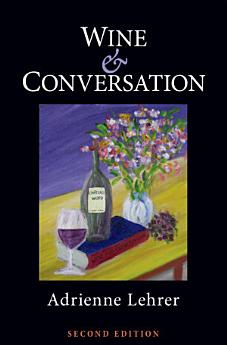Wine and Conversation: Edition 2
04/2009 · Oxford University Press
Livro eletrónico
336
Páginas
family_home
Elegível
info
reportAs classificações e as críticas não são validadas Saiba mais
Acerca deste livro eletrónico
The vocabulary of wine is large and exceptionally vibrant -- from straight-forward descriptive words like "sweet" and "fragrant", colorful metaphors like "ostentatious" and "brash", to the more technical lexicon of biochemistry. The world of wine vocabulary is growing alongside the current popularity of wine itself, particularly as new words are employed by professional wine writers, who not only want to write interesting prose, but avoid repetition and cliché. The question is, what do these words mean? Can they actually reflect the objective characteristics of wine, and can two drinkers really use and understand these words in the same way? In this second edition of Wine and Conversation, linguist Adrienne Lehrer explores whether or not wine drinkers (both novices and experts) can in fact understand wine words in the same way. Her conclusion, based on experimental results, is no. Even though experts do somewhat better than novices in some experiments, they tend to do well only on wines on which they are carefully trained and/or with which they are very familiar. Does this mean that the elaborate language we use to describe wine is essentially a charade? Lehrer shows that although scientific wine writing requires a precise and shared use of language, drinking wine and talking about it in casual, informal setting with friends is different, and the conversational goals include social bonding as well as communicating information about the wine. Lehrer also shows how language innovation and language play, clearly seen in the names of new wines and wineries, as well as wine descriptors, is yet another influence on the burgeoning and sometimes whimsical world of wine vocabulary.
Acerca do autor
Adrienne Lehrer is Professor of Linguistics (Emerita), University of Arizona. Lehrer has written on many aspects of lexical semantics: the structures of vocabularies and how words in a language are semantically related to one another. She has used wine descriptors and cooking words to test semantic theories. Recent woek has focused on creative neologisms, especially blends and the meaning of affixes.
Classifique este livro eletrónico
Dê-nos a sua opinião.
Informações de leitura
Smartphones e tablets
Instale a app Google Play Livros para Android e iPad/iPhone. A aplicação é sincronizada automaticamente com a sua conta e permite-lhe ler online ou offline, onde quer que esteja.
Portáteis e computadores
Pode ouvir audiolivros comprados no Google Play através do navegador de Internet do seu computador.
eReaders e outros dispositivos
Para ler em dispositivos e-ink, como e-readers Kobo, tem de transferir um ficheiro e movê-lo para o seu dispositivo. Siga as instruções detalhadas do Centro de Ajuda para transferir os ficheiros para os e-readers suportados.





